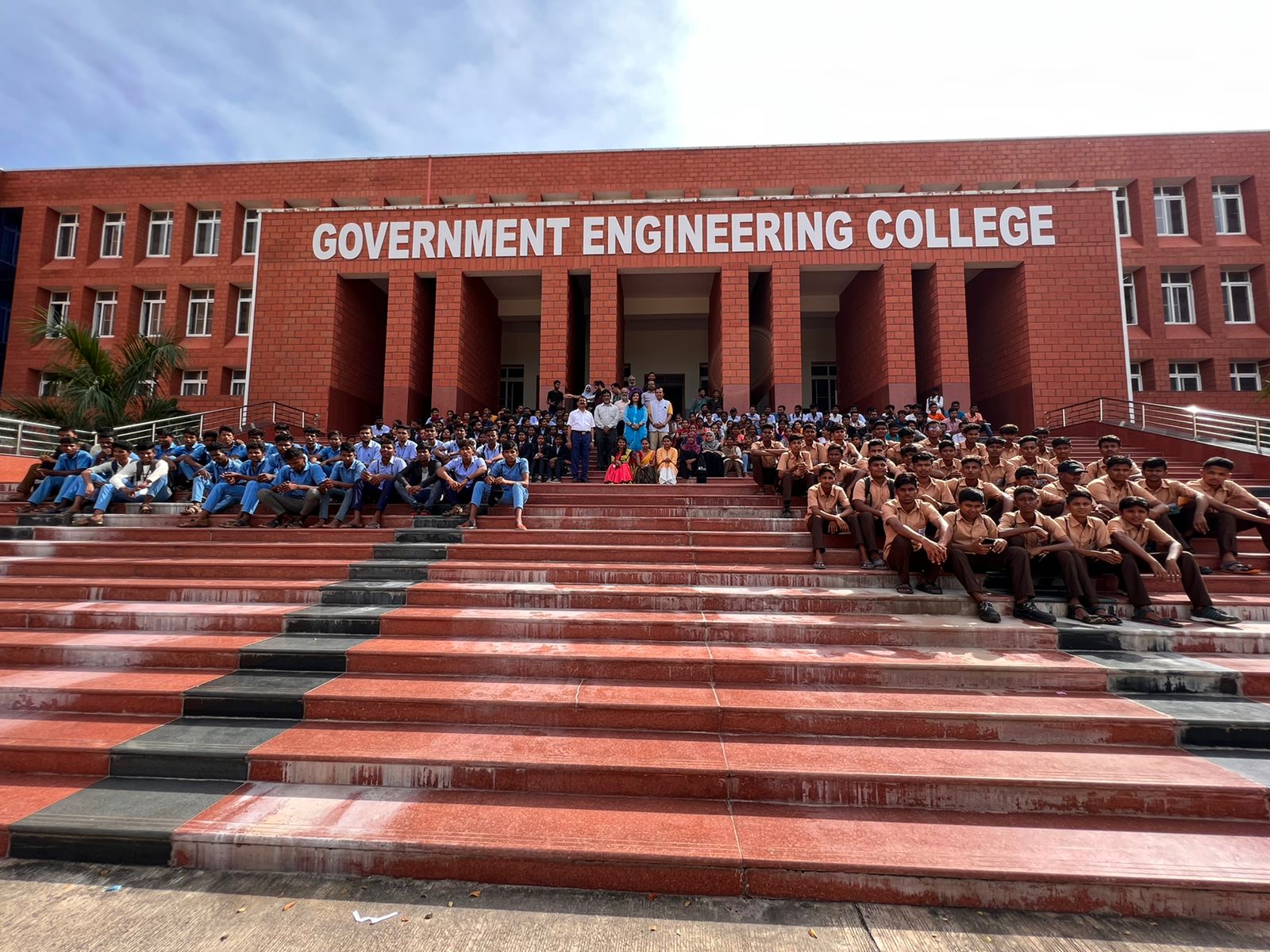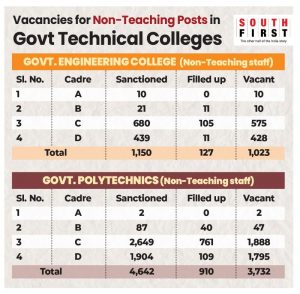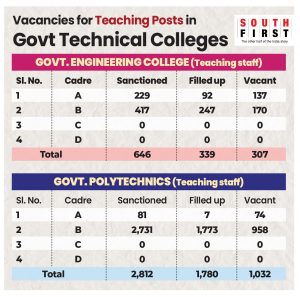Minister for Higher Education MC Sudhakar blames Finance Department for over 47% teaching positions in engineering colleges and 36.70% in polytechnics lying vacant.
Published Jul 23, 2024 | 9:00 AM ⚊ Updated Jul 23, 2024 | 9:00 AM

Representation Image (Supplied)
The impressive buildings look incongruous with the state of affairs in Karnataka’s engineering and polytechnic colleges.
At the receiving end of this incongruity are the students — thousands of them — even as the state’s Minister for Higher Education MC Sudhakar kept blaming the Finance Department.
Simply put, the colleges do not have enough teachers or non-teaching staff to run the daily affairs, affecting the quality of education, research, and innovation.
Teaching positions remaining vacant are not negligible. A whopping 47.52 percent of teaching positions are lying vacant in engineering colleges, even as the students “visit” — rather than “attend” — their respective colleges, where guest lecturers handle the classes.
The necessary guidance and mentorship needed for their success remain on the pages of college prospectuses like hollow promises.
The future of Karnataka’s engineering students hangs in the balance as government engineering and polytechnic colleges grapple with a severe shortage of teaching and non-teaching staff.
If 47.52 percent of teaching positions are vacant, 88.96 percent of non-teaching staff posts remain unfilled. It has resulted in an over-reliance on contract employees, who are often not equipped to handle the responsibilities of managing academic and administrative tasks.
In state-run polytechnics, 36.70 percent of teaching posts and 80.40 percent of non-teaching posts are lying vacant. College principals, who find to maintain standards and provide quality education to students, are handicapped and a worried lot.
Brick and mortar alone won’t make students successful: they need quality teachers as well. The present state of affairs in Karnataka looks like the students are being engineered to lose.
Responding, Minister Sudhakar said the Finance Department was not approving the proposals sent for clearance to fill the vacant teaching and non-teaching posts.

Vacancies for Non-teaching posts in the government engineering and polytechnic colleges.(South First)
According to the Department of Technical Education, the state has 16 engineering colleges. The government has sanctioned 646 teaching posts, and only 339 have been filled, while the remaining 307 are vacant.
“Out of the total sanctioned posts, 229 Grade-A teaching posts have been sanctioned but only 92 have been filled, leaving 137 posts vacant. Similarly, 417 Grade-B teaching posts have been sanctioned. A total of 247 were filled and 170 remaining are vacant,” a senior official said.
“This translates to a vacancy rate of 59.82 percent for Grade-A posts and 40.76 percent for Grade-B posts in state-run engineering colleges,” he added.
The government has sanctioned 10 Grade-A non-teaching posts for engineering colleges — all are remaining vacant at the time of filing this report.
For Grade-B non-teaching posts, 21 have been sanctioned, but only 11 have been filled, leaving 10 vacant. Additionally, 680 Grade-C posts have been sanctioned. As many as 105 posts were filled, while 575 are lying vacant.
Similarly, 439 Grade-D posts have been sanctioned. Eleven have been filled, leaving 428 vacant.

Vacancies for the teaching posts in the government engineering and polytechnic colleges. (South First)
The Department of Technical Education has reported a significant shortage of teaching and non-teaching staff in state-run polytechnic colleges.
Out of 2,812 sanctioned teaching posts, only 1,780 have been filled, leaving 1,032 vacant — a staff shortage of 36.70 percent.
Specifically, Grade-A teaching posts have a 91.36 percent vacancy rate, with only seven out of 81 sanctioned posts filled, while Grade-B teaching posts have a 35.08 percent vacancy rate, with 1,773 out of 2,731 posts filled.
Regarding non-teaching staff, the department reports an 80.4 percent overall vacancy rate. Grade-A non-teaching posts are 100 percent vacant, with neither of the two sanctioned posts filled.
Grade-B non-teaching posts have a 54.02 percent vacancy rate, with 40 out of 87 posts filled. Grade-C posts have a 71.27 percent vacancy rate, with 761 out of 2,649 posts filled, and Grade-D posts have a 94.28 percent vacancy rate, with 109 out of 1,904 posts filled.
Principals of government engineering colleges have raised concerns over the inadequate staff strength, admitting that they were struggling to manage their institutions.
With the shortage of teaching and non-teaching staff, the college principals were compelled to hire the guest faculty on an annual contract basis to run the institutions.
“The recruitment of lecturers, assistants, and associate lecturers for the engineering colleges has not happened since 2009. Most of the state-run engineering colleges depend heavily on the guest faculty to run the institutions,” Karwar’s Government Engineering College (GECK) in-charge principal Dr Shantala B told South First.
“In our college, 12 teaching posts have been sanctioned for the Civil Department. Seven have been filled, and five are vacant. In the Computer Science Department, seven posts have been sanctioned, and six are vacant,” she explained.
“Likewise, in the Electronic and Communications Department, 12 teaching posts are sanctioned — nine are vacant. In the Mechanical Department, 12 posts sanctioned, and only two have been filled,” the GECK principal said, adding that the non-teaching staff strength was not different.
She reasoned that the college’s location might be deterring the teachers. “The college is located 14 km from the district headquarters in Karwar. The teaching staff are not keen to work in this college, due to the lack of basic facilities including transportation and accommodation.”
“Even the promotion of teachers on caste-based reservations has been going on at a snail’s pace for the past 10 years. With the available regular staff, we are grappling to run laboratories, classes, and even administration as well. However, we are putting our best efforts into providing quality education to the students,” Shantala also added that the guest faculty’s salary has been pending since April 2024.
The manpower crunch is just confined to GECK. Even the Government Engineering College in Koppal, Bidar, Gangavathi, Chamarajanagara, and Haveri are facing similar issues.
“The government has sanctioned 29 teaching posts, and only 13 are filled. The government is yet to announce fresh sanctioned posts pattern for this new engineering college. To overcome staff shortage, we hired 41 guest lecturers for five branches,” Koppal’s GCE principal Dr Virupaxi Bagodi told South First.
“It is difficult to manage the institution without the sanctioned teaching and non-teaching staff. We are running the college with 80 to 85 percent student strength,”
“The department is said to have sent the proposal for the finance department to recruit staff for engineering colleges. We are hopeful about it. There is no dearth of grants. However, the guest lecturers’ salaries have been pending for the past six months,” Bagodi said, adding that the situation was the same in most engineering colleges that were established after 2009.
A senior staff member of the Sri Krishnarajendra Silver Jubilee Technological Institute said the college was not facing a staff shortage due to its location in the state capital. “People are eager to work here more than the in districts,” he said.
However, the college has a shortage of non-teaching and other support staff.
The state of affairs in government polytechnic colleges is not different. College principals said teaching posts were last filled in 2011.
As per the All-India Council for Technical Education (AICTE) norms, the teaching staff-to-helper ratio should be 1:6. For each stream, there should be six helpers.
“In reality, the ratio is not followed. The previous government assured us of more staff after the implementation of the National Education Policy (NEP),” he told South First, requesting anonymity.
“They claimed that NEP would change the fate of polytechnic colleges as it stresses more on practical and skill-oriented education. As soon as the new government came, they abolished the NEP. The expected recruitment did not happen,” he said.
“The government stresses on providing practical education to the students. There is barely any manpower to provide quality practical education to the students. The laboratories cannot be run by just one person,” he said.
Another principal, who also wished not to be identified, said lecturers were last recruited in 2011.
“Thereafter, there are no recruitments. The department sent a proposal to the finance department, seeking its approval to recruit more teaching staff in 2012,” he said, adding that nothing had happened.
“The government claimed it would amend the Cadre and Recruitment Rules (C&R) in 2012-13 and then carry out recruitment. The government is yet to amend the C&R rules to recruit professors,” he said. C&R was last amended in 2007.
“Colleges cannot ensure quality education with the guest faculty every year,” he added.
Minister for Higher Education Sudhakar blamed the Finance Department for the staff shortage. He said the department had not given its approval despite multiple proposals on the recruitment of staff in the government engineering and polytechnic colleges.
Admitting the shortage of teaching and non-teaching staff in the government engineering and polytechnic colleges in Karnataka, Sudhakar said, “The teaching and non-teaching vacant posts are not a new issue. The successive government for the last decade have not filled them.”
“I am aware of the issues that the government engineering and polytechnic colleges are facing,” he told South First.
“Proposals have been made to the Finance Department several times. They are saving money for the government,” the minister added.
On his department’s plans, he said the Congress 2023 election manifesto promised to fill 2.5 lakh vacant government posts. The government has also implemented the 7th Pay Commission, which was another fiscal burden to the tune of ₹20,000 crore.”
“I have held talks with the chief minister on filling the vacant teaching and non-teaching posts. The proposal has been sent to the Finance Department. The chief minister has responded positively,” he said.
Chief Minister Siddaramaiah holds the Finance finance portfolio in Karnataka.
“As soon as the Finance Department gives its nod, the vacant posts will be filled in a phased manner. We will equally distribute the manpower for engineering and polytechnic colleges,” the minister told South First.
Sudhakar refuted the allegations of pending wages of several guest lecturers since April 2024. “I have met the Guest Lecturers Association recently and it did not raise such an issue. This has not come to my notice. I won’t deny that there might be two or three cases,” he said, adding that it would be addressed immediately.
The minister said the guest lecturers were happy about their pay package. “They even felicitated me,” Sudhakar said.
“There are a lot of formalities that need to be carried out before beginning the recruitment process. We are also facing several legal hurdles. We have to take decisions cautiously,” Sudhakar expressed confidence in getting the Finance Department’s for the recruitment of teaching and non-teaching staff.
(Edited by Majnu Babu).
(South First is now on WhatsApp and Telegram)
